Management Model and PESTEL Analysis of Tesco
VerifiedAdded on 2023/01/06
|10
|2703
|52
AI Summary
This report evaluates the management model implemented by Tesco and conducts a PESTEL analysis to analyze the macro environment and operations of the business enterprise.
Contribute Materials
Your contribution can guide someone’s learning journey. Share your
documents today.
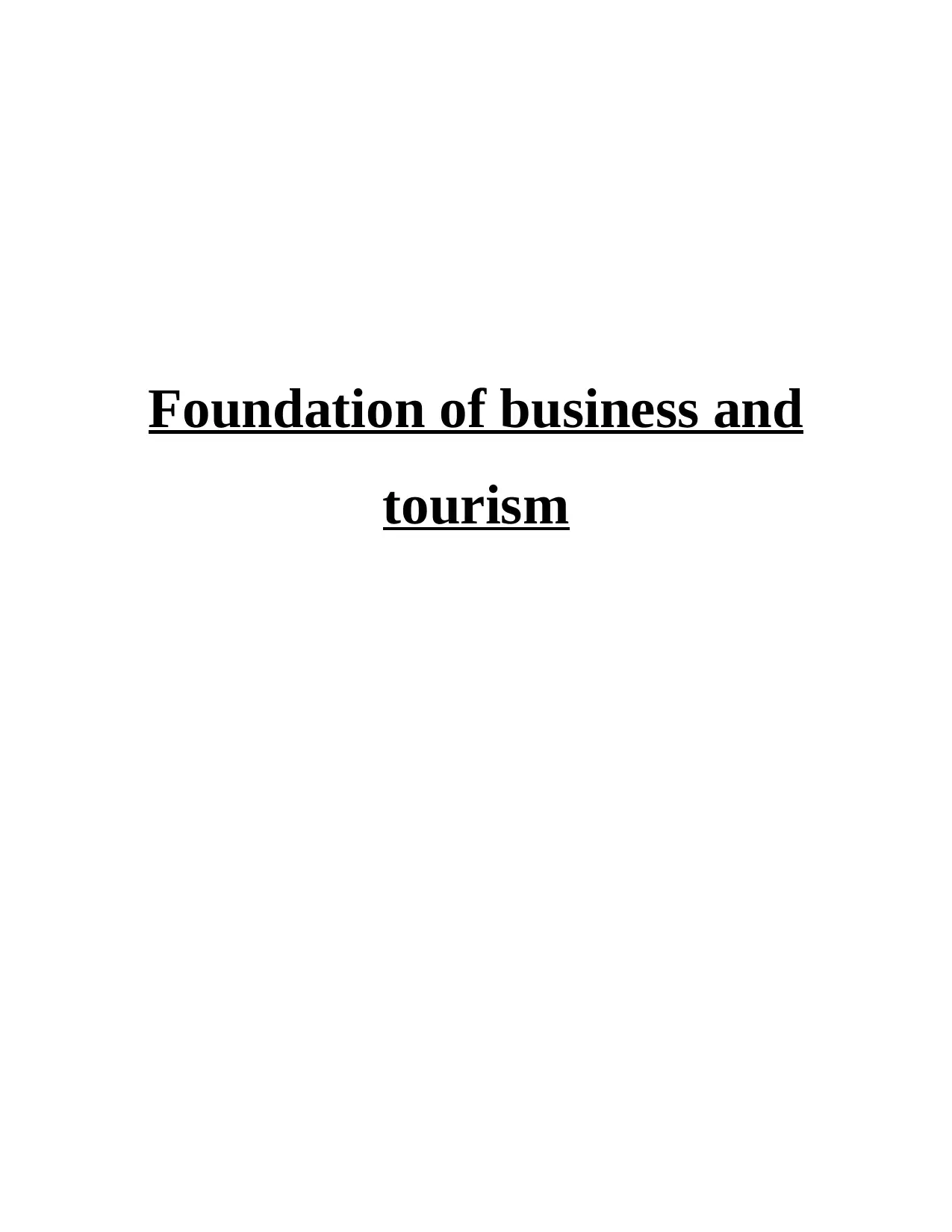
Foundation of business and
tourism
tourism
Secure Best Marks with AI Grader
Need help grading? Try our AI Grader for instant feedback on your assignments.
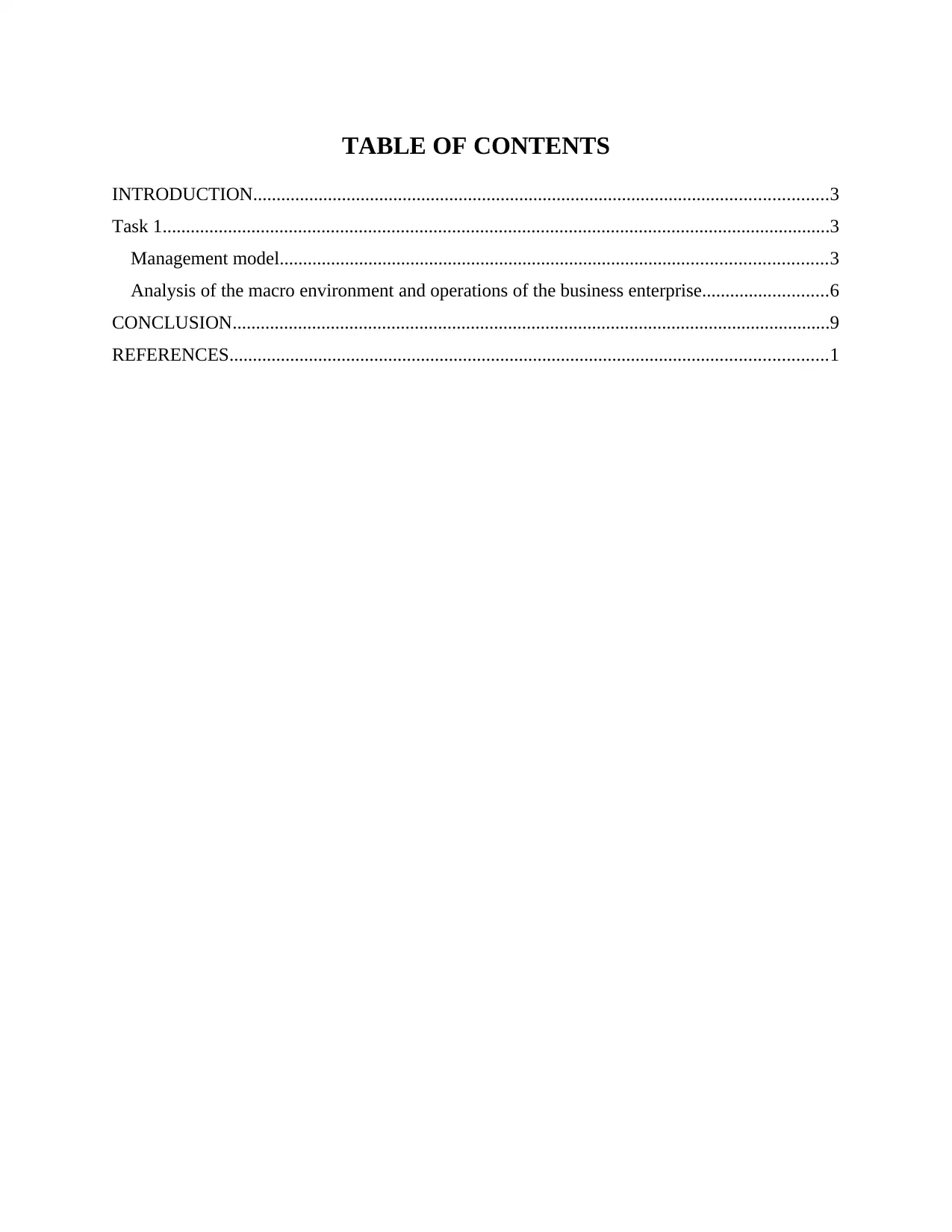
TABLE OF CONTENTS
INTRODUCTION...........................................................................................................................3
Task 1...............................................................................................................................................3
Management model.....................................................................................................................3
Analysis of the macro environment and operations of the business enterprise...........................6
CONCLUSION................................................................................................................................9
REFERENCES................................................................................................................................1
INTRODUCTION...........................................................................................................................3
Task 1...............................................................................................................................................3
Management model.....................................................................................................................3
Analysis of the macro environment and operations of the business enterprise...........................6
CONCLUSION................................................................................................................................9
REFERENCES................................................................................................................................1
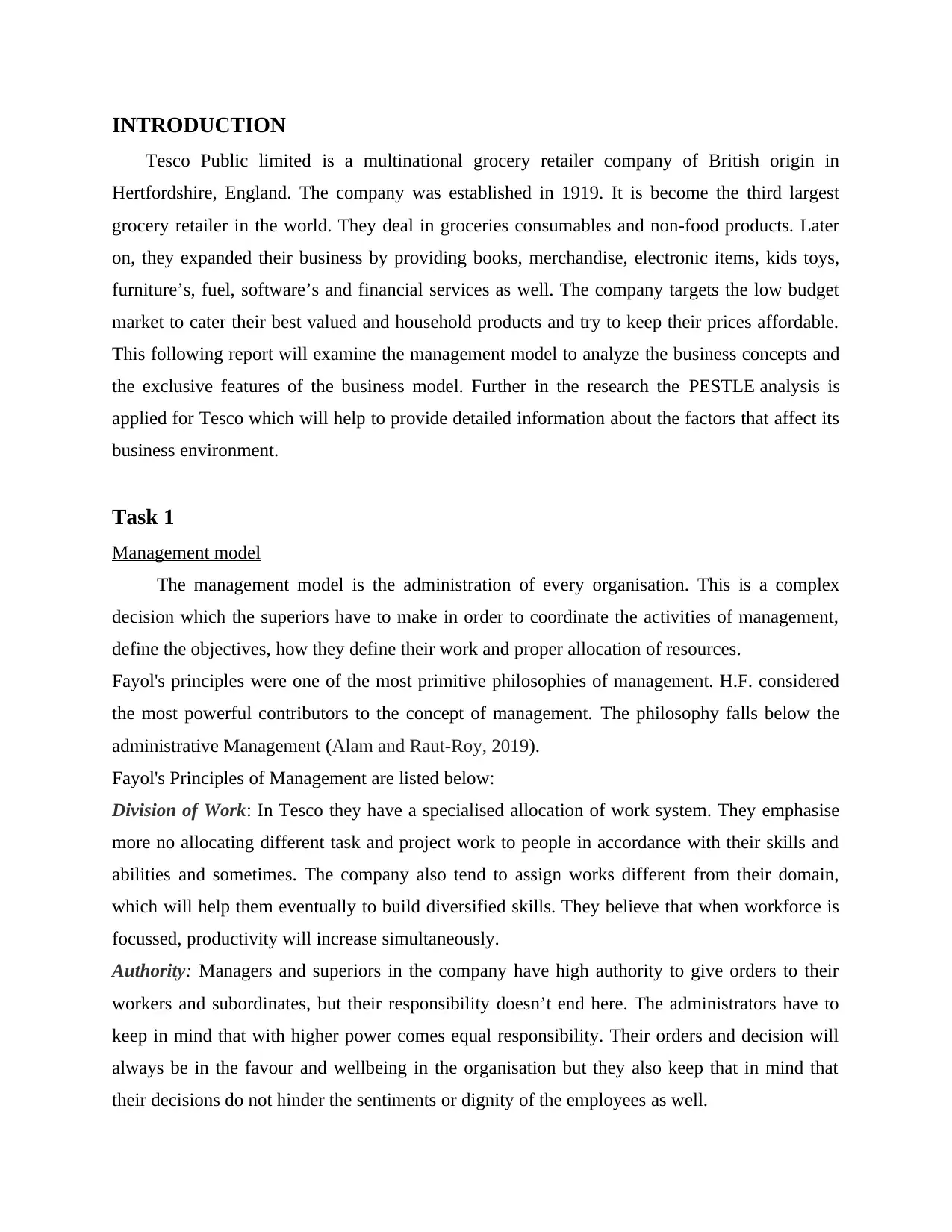
INTRODUCTION
Tesco Public limited is a multinational grocery retailer company of British origin in
Hertfordshire, England. The company was established in 1919. It is become the third largest
grocery retailer in the world. They deal in groceries consumables and non-food products. Later
on, they expanded their business by providing books, merchandise, electronic items, kids toys,
furniture’s, fuel, software’s and financial services as well. The company targets the low budget
market to cater their best valued and household products and try to keep their prices affordable.
This following report will examine the management model to analyze the business concepts and
the exclusive features of the business model. Further in the research the PESTLE analysis is
applied for Tesco which will help to provide detailed information about the factors that affect its
business environment.
Task 1
Management model
The management model is the administration of every organisation. This is a complex
decision which the superiors have to make in order to coordinate the activities of management,
define the objectives, how they define their work and proper allocation of resources.
Fayol's principles were one of the most primitive philosophies of management. H.F. considered
the most powerful contributors to the concept of management. The philosophy falls below the
administrative Management (Alam and Raut-Roy, 2019).
Fayol's Principles of Management are listed below:
Division of Work: In Tesco they have a specialised allocation of work system. They emphasise
more no allocating different task and project work to people in accordance with their skills and
abilities and sometimes. The company also tend to assign works different from their domain,
which will help them eventually to build diversified skills. They believe that when workforce is
focussed, productivity will increase simultaneously.
Authority: Managers and superiors in the company have high authority to give orders to their
workers and subordinates, but their responsibility doesn’t end here. The administrators have to
keep in mind that with higher power comes equal responsibility. Their orders and decision will
always be in the favour and wellbeing in the organisation but they also keep that in mind that
their decisions do not hinder the sentiments or dignity of the employees as well.
Tesco Public limited is a multinational grocery retailer company of British origin in
Hertfordshire, England. The company was established in 1919. It is become the third largest
grocery retailer in the world. They deal in groceries consumables and non-food products. Later
on, they expanded their business by providing books, merchandise, electronic items, kids toys,
furniture’s, fuel, software’s and financial services as well. The company targets the low budget
market to cater their best valued and household products and try to keep their prices affordable.
This following report will examine the management model to analyze the business concepts and
the exclusive features of the business model. Further in the research the PESTLE analysis is
applied for Tesco which will help to provide detailed information about the factors that affect its
business environment.
Task 1
Management model
The management model is the administration of every organisation. This is a complex
decision which the superiors have to make in order to coordinate the activities of management,
define the objectives, how they define their work and proper allocation of resources.
Fayol's principles were one of the most primitive philosophies of management. H.F. considered
the most powerful contributors to the concept of management. The philosophy falls below the
administrative Management (Alam and Raut-Roy, 2019).
Fayol's Principles of Management are listed below:
Division of Work: In Tesco they have a specialised allocation of work system. They emphasise
more no allocating different task and project work to people in accordance with their skills and
abilities and sometimes. The company also tend to assign works different from their domain,
which will help them eventually to build diversified skills. They believe that when workforce is
focussed, productivity will increase simultaneously.
Authority: Managers and superiors in the company have high authority to give orders to their
workers and subordinates, but their responsibility doesn’t end here. The administrators have to
keep in mind that with higher power comes equal responsibility. Their orders and decision will
always be in the favour and wellbeing in the organisation but they also keep that in mind that
their decisions do not hinder the sentiments or dignity of the employees as well.
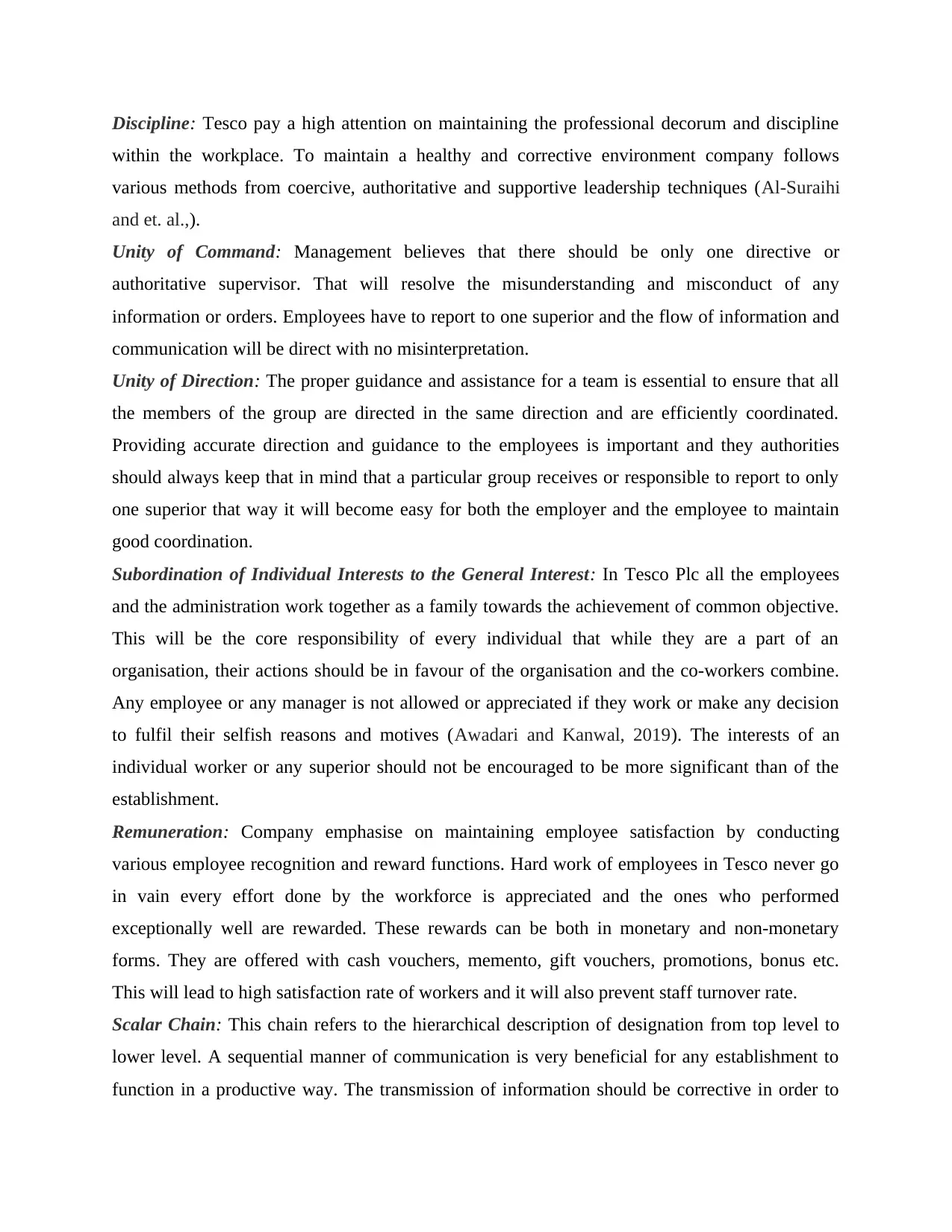
Discipline: Tesco pay a high attention on maintaining the professional decorum and discipline
within the workplace. To maintain a healthy and corrective environment company follows
various methods from coercive, authoritative and supportive leadership techniques (Al-Suraihi
and et. al.,).
Unity of Command: Management believes that there should be only one directive or
authoritative supervisor. That will resolve the misunderstanding and misconduct of any
information or orders. Employees have to report to one superior and the flow of information and
communication will be direct with no misinterpretation.
Unity of Direction: The proper guidance and assistance for a team is essential to ensure that all
the members of the group are directed in the same direction and are efficiently coordinated.
Providing accurate direction and guidance to the employees is important and they authorities
should always keep that in mind that a particular group receives or responsible to report to only
one superior that way it will become easy for both the employer and the employee to maintain
good coordination.
Subordination of Individual Interests to the General Interest: In Tesco Plc all the employees
and the administration work together as a family towards the achievement of common objective.
This will be the core responsibility of every individual that while they are a part of an
organisation, their actions should be in favour of the organisation and the co-workers combine.
Any employee or any manager is not allowed or appreciated if they work or make any decision
to fulfil their selfish reasons and motives (Awadari and Kanwal, 2019). The interests of an
individual worker or any superior should not be encouraged to be more significant than of the
establishment.
Remuneration: Company emphasise on maintaining employee satisfaction by conducting
various employee recognition and reward functions. Hard work of employees in Tesco never go
in vain every effort done by the workforce is appreciated and the ones who performed
exceptionally well are rewarded. These rewards can be both in monetary and non-monetary
forms. They are offered with cash vouchers, memento, gift vouchers, promotions, bonus etc.
This will lead to high satisfaction rate of workers and it will also prevent staff turnover rate.
Scalar Chain: This chain refers to the hierarchical description of designation from top level to
lower level. A sequential manner of communication is very beneficial for any establishment to
function in a productive way. The transmission of information should be corrective in order to
within the workplace. To maintain a healthy and corrective environment company follows
various methods from coercive, authoritative and supportive leadership techniques (Al-Suraihi
and et. al.,).
Unity of Command: Management believes that there should be only one directive or
authoritative supervisor. That will resolve the misunderstanding and misconduct of any
information or orders. Employees have to report to one superior and the flow of information and
communication will be direct with no misinterpretation.
Unity of Direction: The proper guidance and assistance for a team is essential to ensure that all
the members of the group are directed in the same direction and are efficiently coordinated.
Providing accurate direction and guidance to the employees is important and they authorities
should always keep that in mind that a particular group receives or responsible to report to only
one superior that way it will become easy for both the employer and the employee to maintain
good coordination.
Subordination of Individual Interests to the General Interest: In Tesco Plc all the employees
and the administration work together as a family towards the achievement of common objective.
This will be the core responsibility of every individual that while they are a part of an
organisation, their actions should be in favour of the organisation and the co-workers combine.
Any employee or any manager is not allowed or appreciated if they work or make any decision
to fulfil their selfish reasons and motives (Awadari and Kanwal, 2019). The interests of an
individual worker or any superior should not be encouraged to be more significant than of the
establishment.
Remuneration: Company emphasise on maintaining employee satisfaction by conducting
various employee recognition and reward functions. Hard work of employees in Tesco never go
in vain every effort done by the workforce is appreciated and the ones who performed
exceptionally well are rewarded. These rewards can be both in monetary and non-monetary
forms. They are offered with cash vouchers, memento, gift vouchers, promotions, bonus etc.
This will lead to high satisfaction rate of workers and it will also prevent staff turnover rate.
Scalar Chain: This chain refers to the hierarchical description of designation from top level to
lower level. A sequential manner of communication is very beneficial for any establishment to
function in a productive way. The transmission of information should be corrective in order to
Secure Best Marks with AI Grader
Need help grading? Try our AI Grader for instant feedback on your assignments.
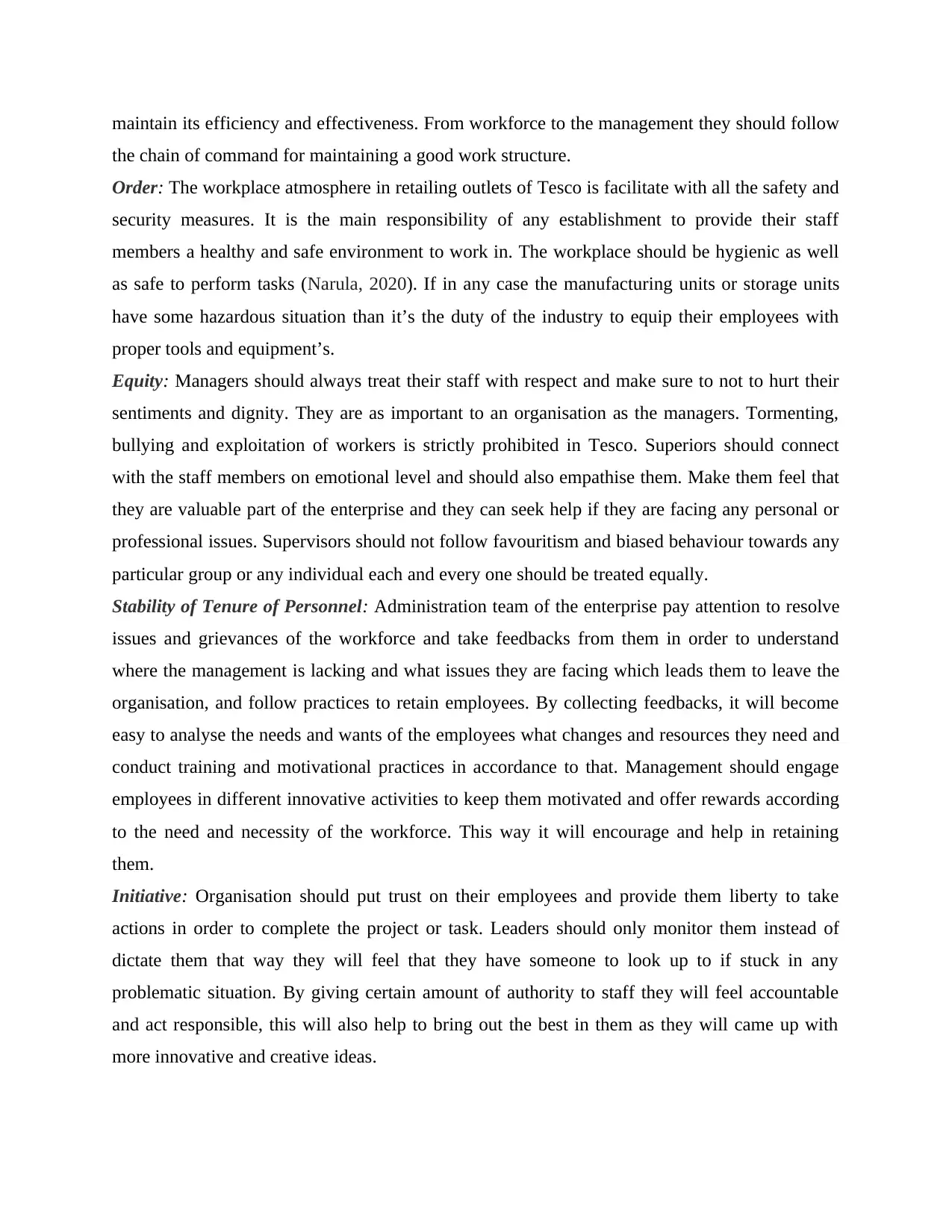
maintain its efficiency and effectiveness. From workforce to the management they should follow
the chain of command for maintaining a good work structure.
Order: The workplace atmosphere in retailing outlets of Tesco is facilitate with all the safety and
security measures. It is the main responsibility of any establishment to provide their staff
members a healthy and safe environment to work in. The workplace should be hygienic as well
as safe to perform tasks (Narula, 2020). If in any case the manufacturing units or storage units
have some hazardous situation than it’s the duty of the industry to equip their employees with
proper tools and equipment’s.
Equity: Managers should always treat their staff with respect and make sure to not to hurt their
sentiments and dignity. They are as important to an organisation as the managers. Tormenting,
bullying and exploitation of workers is strictly prohibited in Tesco. Superiors should connect
with the staff members on emotional level and should also empathise them. Make them feel that
they are valuable part of the enterprise and they can seek help if they are facing any personal or
professional issues. Supervisors should not follow favouritism and biased behaviour towards any
particular group or any individual each and every one should be treated equally.
Stability of Tenure of Personnel: Administration team of the enterprise pay attention to resolve
issues and grievances of the workforce and take feedbacks from them in order to understand
where the management is lacking and what issues they are facing which leads them to leave the
organisation, and follow practices to retain employees. By collecting feedbacks, it will become
easy to analyse the needs and wants of the employees what changes and resources they need and
conduct training and motivational practices in accordance to that. Management should engage
employees in different innovative activities to keep them motivated and offer rewards according
to the need and necessity of the workforce. This way it will encourage and help in retaining
them.
Initiative: Organisation should put trust on their employees and provide them liberty to take
actions in order to complete the project or task. Leaders should only monitor them instead of
dictate them that way they will feel that they have someone to look up to if stuck in any
problematic situation. By giving certain amount of authority to staff they will feel accountable
and act responsible, this will also help to bring out the best in them as they will came up with
more innovative and creative ideas.
the chain of command for maintaining a good work structure.
Order: The workplace atmosphere in retailing outlets of Tesco is facilitate with all the safety and
security measures. It is the main responsibility of any establishment to provide their staff
members a healthy and safe environment to work in. The workplace should be hygienic as well
as safe to perform tasks (Narula, 2020). If in any case the manufacturing units or storage units
have some hazardous situation than it’s the duty of the industry to equip their employees with
proper tools and equipment’s.
Equity: Managers should always treat their staff with respect and make sure to not to hurt their
sentiments and dignity. They are as important to an organisation as the managers. Tormenting,
bullying and exploitation of workers is strictly prohibited in Tesco. Superiors should connect
with the staff members on emotional level and should also empathise them. Make them feel that
they are valuable part of the enterprise and they can seek help if they are facing any personal or
professional issues. Supervisors should not follow favouritism and biased behaviour towards any
particular group or any individual each and every one should be treated equally.
Stability of Tenure of Personnel: Administration team of the enterprise pay attention to resolve
issues and grievances of the workforce and take feedbacks from them in order to understand
where the management is lacking and what issues they are facing which leads them to leave the
organisation, and follow practices to retain employees. By collecting feedbacks, it will become
easy to analyse the needs and wants of the employees what changes and resources they need and
conduct training and motivational practices in accordance to that. Management should engage
employees in different innovative activities to keep them motivated and offer rewards according
to the need and necessity of the workforce. This way it will encourage and help in retaining
them.
Initiative: Organisation should put trust on their employees and provide them liberty to take
actions in order to complete the project or task. Leaders should only monitor them instead of
dictate them that way they will feel that they have someone to look up to if stuck in any
problematic situation. By giving certain amount of authority to staff they will feel accountable
and act responsible, this will also help to bring out the best in them as they will came up with
more innovative and creative ideas.
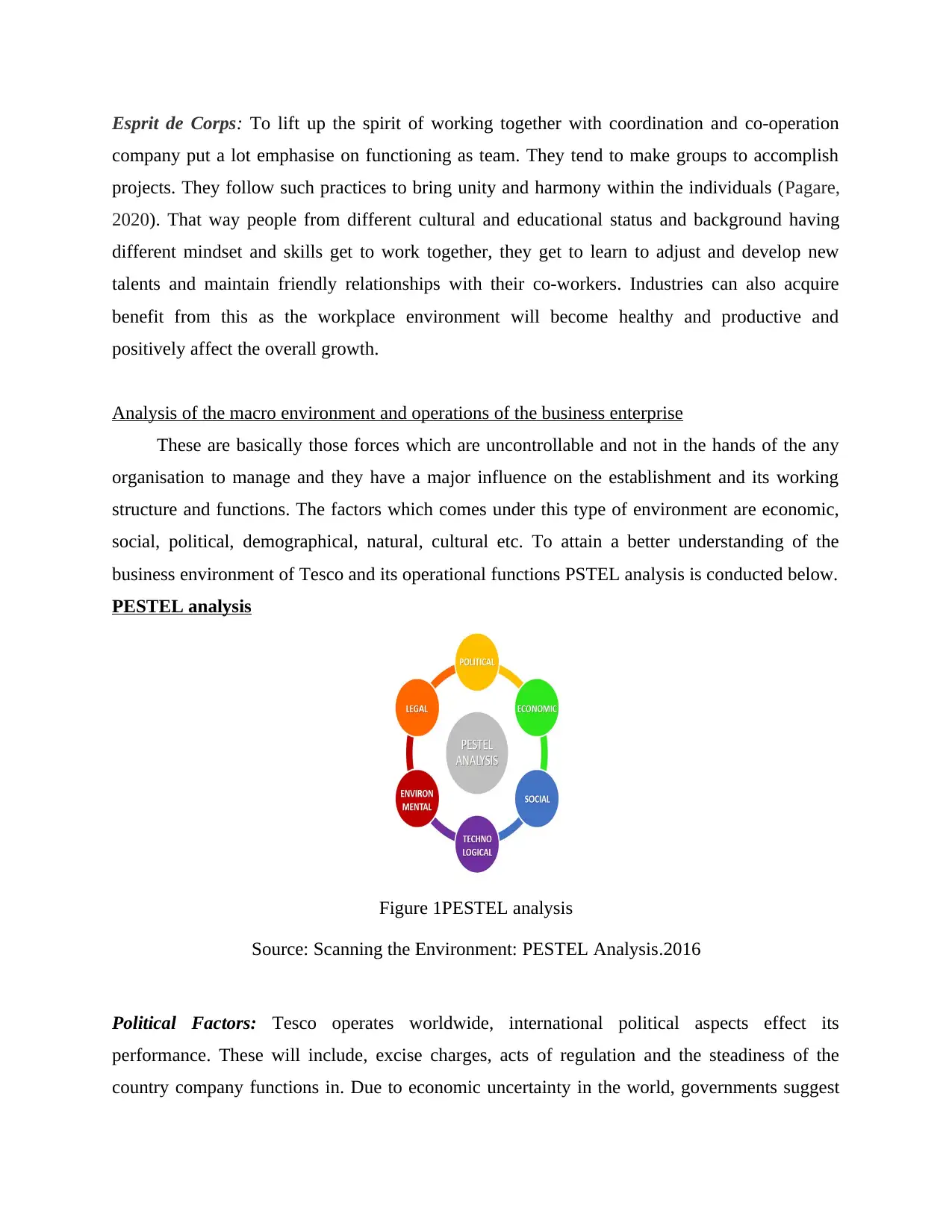
Esprit de Corps: To lift up the spirit of working together with coordination and co-operation
company put a lot emphasise on functioning as team. They tend to make groups to accomplish
projects. They follow such practices to bring unity and harmony within the individuals (Pagare,
2020). That way people from different cultural and educational status and background having
different mindset and skills get to work together, they get to learn to adjust and develop new
talents and maintain friendly relationships with their co-workers. Industries can also acquire
benefit from this as the workplace environment will become healthy and productive and
positively affect the overall growth.
Analysis of the macro environment and operations of the business enterprise
These are basically those forces which are uncontrollable and not in the hands of the any
organisation to manage and they have a major influence on the establishment and its working
structure and functions. The factors which comes under this type of environment are economic,
social, political, demographical, natural, cultural etc. To attain a better understanding of the
business environment of Tesco and its operational functions PSTEL analysis is conducted below.
PESTEL analysis
Figure 1PESTEL analysis
Source: Scanning the Environment: PESTEL Analysis.2016
Political Factors: Tesco operates worldwide, international political aspects effect its
performance. These will include, excise charges, acts of regulation and the steadiness of the
country company functions in. Due to economic uncertainty in the world, governments suggest
company put a lot emphasise on functioning as team. They tend to make groups to accomplish
projects. They follow such practices to bring unity and harmony within the individuals (Pagare,
2020). That way people from different cultural and educational status and background having
different mindset and skills get to work together, they get to learn to adjust and develop new
talents and maintain friendly relationships with their co-workers. Industries can also acquire
benefit from this as the workplace environment will become healthy and productive and
positively affect the overall growth.
Analysis of the macro environment and operations of the business enterprise
These are basically those forces which are uncontrollable and not in the hands of the any
organisation to manage and they have a major influence on the establishment and its working
structure and functions. The factors which comes under this type of environment are economic,
social, political, demographical, natural, cultural etc. To attain a better understanding of the
business environment of Tesco and its operational functions PSTEL analysis is conducted below.
PESTEL analysis
Figure 1PESTEL analysis
Source: Scanning the Environment: PESTEL Analysis.2016
Political Factors: Tesco operates worldwide, international political aspects effect its
performance. These will include, excise charges, acts of regulation and the steadiness of the
country company functions in. Due to economic uncertainty in the world, governments suggest
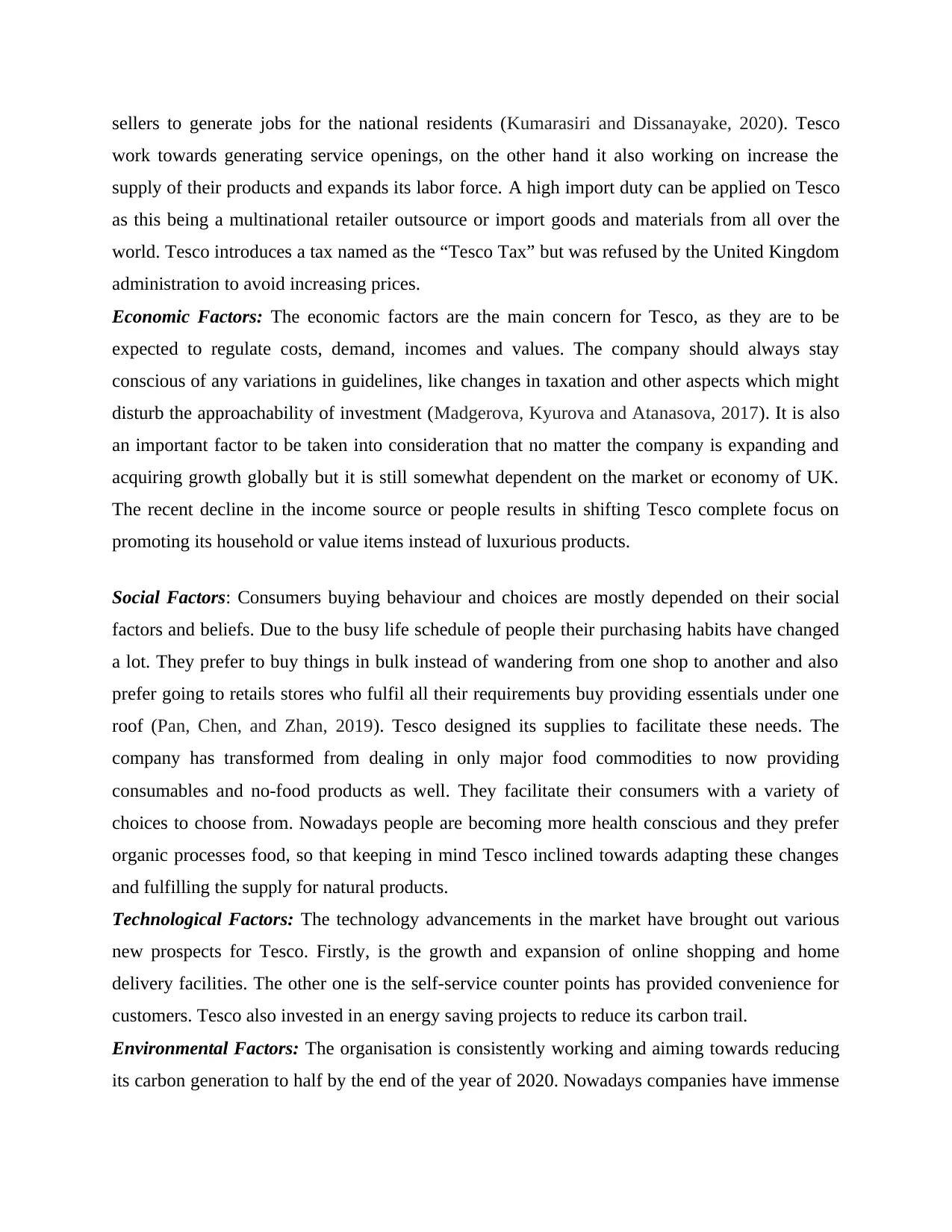
sellers to generate jobs for the national residents (Kumarasiri and Dissanayake, 2020). Tesco
work towards generating service openings, on the other hand it also working on increase the
supply of their products and expands its labor force. A high import duty can be applied on Tesco
as this being a multinational retailer outsource or import goods and materials from all over the
world. Tesco introduces a tax named as the “Tesco Tax” but was refused by the United Kingdom
administration to avoid increasing prices.
Economic Factors: The economic factors are the main concern for Tesco, as they are to be
expected to regulate costs, demand, incomes and values. The company should always stay
conscious of any variations in guidelines, like changes in taxation and other aspects which might
disturb the approachability of investment (Madgerova, Kyurova and Atanasova, 2017). It is also
an important factor to be taken into consideration that no matter the company is expanding and
acquiring growth globally but it is still somewhat dependent on the market or economy of UK.
The recent decline in the income source or people results in shifting Tesco complete focus on
promoting its household or value items instead of luxurious products.
Social Factors: Consumers buying behaviour and choices are mostly depended on their social
factors and beliefs. Due to the busy life schedule of people their purchasing habits have changed
a lot. They prefer to buy things in bulk instead of wandering from one shop to another and also
prefer going to retails stores who fulfil all their requirements buy providing essentials under one
roof (Pan, Chen, and Zhan, 2019). Tesco designed its supplies to facilitate these needs. The
company has transformed from dealing in only major food commodities to now providing
consumables and no-food products as well. They facilitate their consumers with a variety of
choices to choose from. Nowadays people are becoming more health conscious and they prefer
organic processes food, so that keeping in mind Tesco inclined towards adapting these changes
and fulfilling the supply for natural products.
Technological Factors: The technology advancements in the market have brought out various
new prospects for Tesco. Firstly, is the growth and expansion of online shopping and home
delivery facilities. The other one is the self-service counter points has provided convenience for
customers. Tesco also invested in an energy saving projects to reduce its carbon trail.
Environmental Factors: The organisation is consistently working and aiming towards reducing
its carbon generation to half by the end of the year of 2020. Nowadays companies have immense
work towards generating service openings, on the other hand it also working on increase the
supply of their products and expands its labor force. A high import duty can be applied on Tesco
as this being a multinational retailer outsource or import goods and materials from all over the
world. Tesco introduces a tax named as the “Tesco Tax” but was refused by the United Kingdom
administration to avoid increasing prices.
Economic Factors: The economic factors are the main concern for Tesco, as they are to be
expected to regulate costs, demand, incomes and values. The company should always stay
conscious of any variations in guidelines, like changes in taxation and other aspects which might
disturb the approachability of investment (Madgerova, Kyurova and Atanasova, 2017). It is also
an important factor to be taken into consideration that no matter the company is expanding and
acquiring growth globally but it is still somewhat dependent on the market or economy of UK.
The recent decline in the income source or people results in shifting Tesco complete focus on
promoting its household or value items instead of luxurious products.
Social Factors: Consumers buying behaviour and choices are mostly depended on their social
factors and beliefs. Due to the busy life schedule of people their purchasing habits have changed
a lot. They prefer to buy things in bulk instead of wandering from one shop to another and also
prefer going to retails stores who fulfil all their requirements buy providing essentials under one
roof (Pan, Chen, and Zhan, 2019). Tesco designed its supplies to facilitate these needs. The
company has transformed from dealing in only major food commodities to now providing
consumables and no-food products as well. They facilitate their consumers with a variety of
choices to choose from. Nowadays people are becoming more health conscious and they prefer
organic processes food, so that keeping in mind Tesco inclined towards adapting these changes
and fulfilling the supply for natural products.
Technological Factors: The technology advancements in the market have brought out various
new prospects for Tesco. Firstly, is the growth and expansion of online shopping and home
delivery facilities. The other one is the self-service counter points has provided convenience for
customers. Tesco also invested in an energy saving projects to reduce its carbon trail.
Environmental Factors: The organisation is consistently working and aiming towards reducing
its carbon generation to half by the end of the year of 2020. Nowadays companies have immense
Paraphrase This Document
Need a fresh take? Get an instant paraphrase of this document with our AI Paraphraser
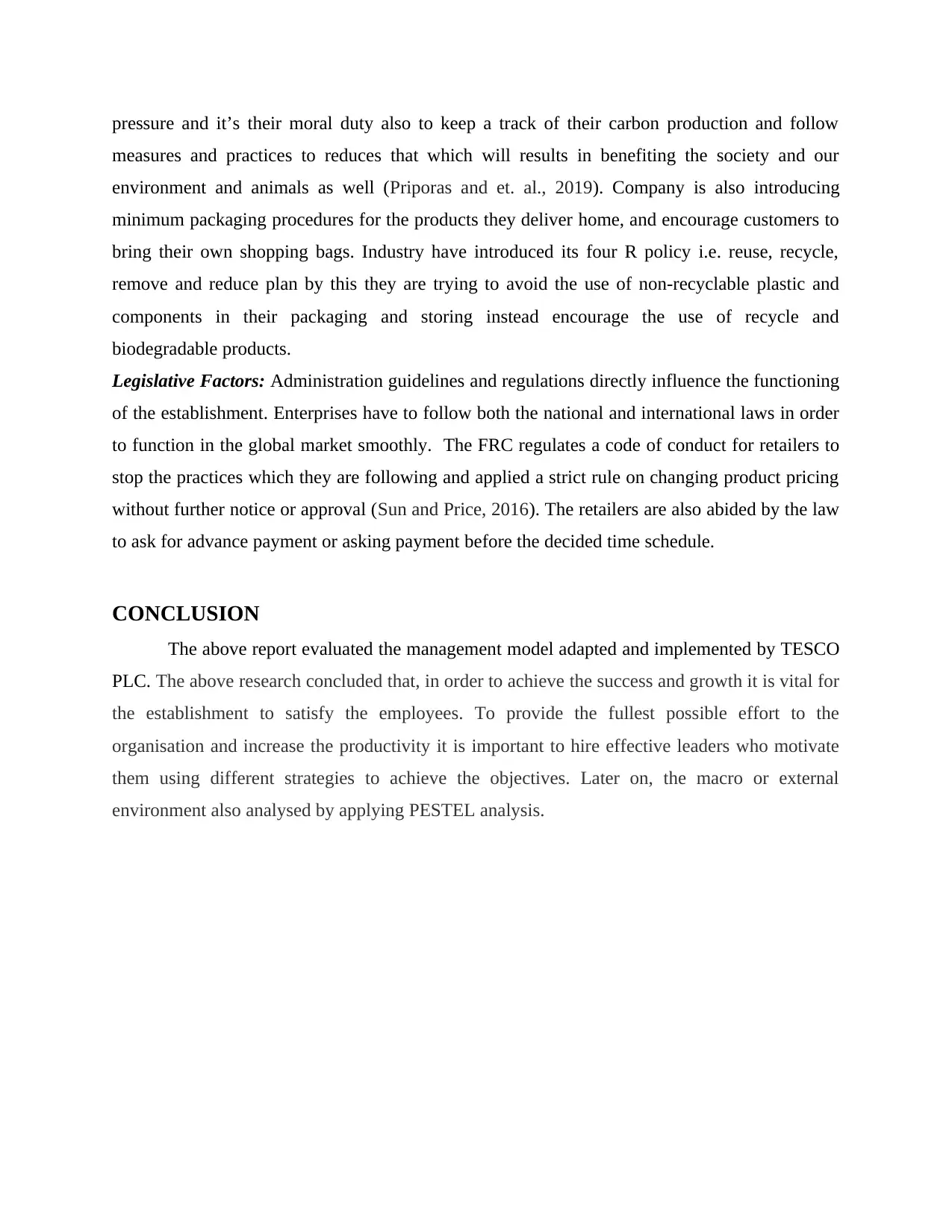
pressure and it’s their moral duty also to keep a track of their carbon production and follow
measures and practices to reduces that which will results in benefiting the society and our
environment and animals as well (Priporas and et. al., 2019). Company is also introducing
minimum packaging procedures for the products they deliver home, and encourage customers to
bring their own shopping bags. Industry have introduced its four R policy i.e. reuse, recycle,
remove and reduce plan by this they are trying to avoid the use of non-recyclable plastic and
components in their packaging and storing instead encourage the use of recycle and
biodegradable products.
Legislative Factors: Administration guidelines and regulations directly influence the functioning
of the establishment. Enterprises have to follow both the national and international laws in order
to function in the global market smoothly. The FRC regulates a code of conduct for retailers to
stop the practices which they are following and applied a strict rule on changing product pricing
without further notice or approval (Sun and Price, 2016). The retailers are also abided by the law
to ask for advance payment or asking payment before the decided time schedule.
CONCLUSION
The above report evaluated the management model adapted and implemented by TESCO
PLC. The above research concluded that, in order to achieve the success and growth it is vital for
the establishment to satisfy the employees. To provide the fullest possible effort to the
organisation and increase the productivity it is important to hire effective leaders who motivate
them using different strategies to achieve the objectives. Later on, the macro or external
environment also analysed by applying PESTEL analysis.
measures and practices to reduces that which will results in benefiting the society and our
environment and animals as well (Priporas and et. al., 2019). Company is also introducing
minimum packaging procedures for the products they deliver home, and encourage customers to
bring their own shopping bags. Industry have introduced its four R policy i.e. reuse, recycle,
remove and reduce plan by this they are trying to avoid the use of non-recyclable plastic and
components in their packaging and storing instead encourage the use of recycle and
biodegradable products.
Legislative Factors: Administration guidelines and regulations directly influence the functioning
of the establishment. Enterprises have to follow both the national and international laws in order
to function in the global market smoothly. The FRC regulates a code of conduct for retailers to
stop the practices which they are following and applied a strict rule on changing product pricing
without further notice or approval (Sun and Price, 2016). The retailers are also abided by the law
to ask for advance payment or asking payment before the decided time schedule.
CONCLUSION
The above report evaluated the management model adapted and implemented by TESCO
PLC. The above research concluded that, in order to achieve the success and growth it is vital for
the establishment to satisfy the employees. To provide the fullest possible effort to the
organisation and increase the productivity it is important to hire effective leaders who motivate
them using different strategies to achieve the objectives. Later on, the macro or external
environment also analysed by applying PESTEL analysis.
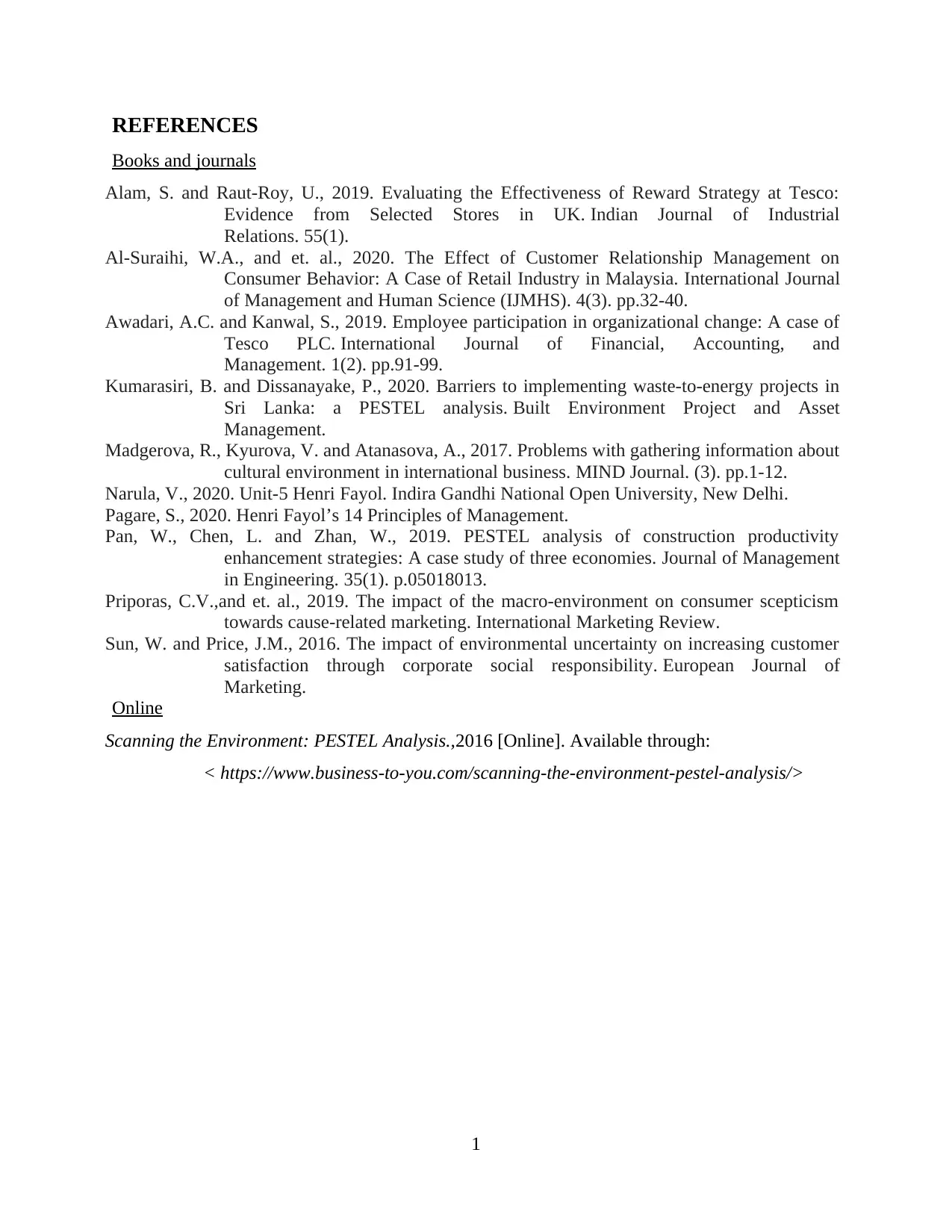
REFERENCES
Books and journals
Alam, S. and Raut-Roy, U., 2019. Evaluating the Effectiveness of Reward Strategy at Tesco:
Evidence from Selected Stores in UK. Indian Journal of Industrial
Relations. 55(1).
Al-Suraihi, W.A., and et. al., 2020. The Effect of Customer Relationship Management on
Consumer Behavior: A Case of Retail Industry in Malaysia. International Journal
of Management and Human Science (IJMHS). 4(3). pp.32-40.
Awadari, A.C. and Kanwal, S., 2019. Employee participation in organizational change: A case of
Tesco PLC. International Journal of Financial, Accounting, and
Management. 1(2). pp.91-99.
Kumarasiri, B. and Dissanayake, P., 2020. Barriers to implementing waste-to-energy projects in
Sri Lanka: a PESTEL analysis. Built Environment Project and Asset
Management.
Madgerova, R., Kyurova, V. and Atanasova, A., 2017. Problems with gathering information about
cultural environment in international business. MIND Journal. (3). pp.1-12.
Narula, V., 2020. Unit-5 Henri Fayol. Indira Gandhi National Open University, New Delhi.
Pagare, S., 2020. Henri Fayol’s 14 Principles of Management.
Pan, W., Chen, L. and Zhan, W., 2019. PESTEL analysis of construction productivity
enhancement strategies: A case study of three economies. Journal of Management
in Engineering. 35(1). p.05018013.
Priporas, C.V.,and et. al., 2019. The impact of the macro-environment on consumer scepticism
towards cause-related marketing. International Marketing Review.
Sun, W. and Price, J.M., 2016. The impact of environmental uncertainty on increasing customer
satisfaction through corporate social responsibility. European Journal of
Marketing.
Online
Scanning the Environment: PESTEL Analysis.,2016 [Online]. Available through:
< https://www.business-to-you.com/scanning-the-environment-pestel-analysis/>
1
Books and journals
Alam, S. and Raut-Roy, U., 2019. Evaluating the Effectiveness of Reward Strategy at Tesco:
Evidence from Selected Stores in UK. Indian Journal of Industrial
Relations. 55(1).
Al-Suraihi, W.A., and et. al., 2020. The Effect of Customer Relationship Management on
Consumer Behavior: A Case of Retail Industry in Malaysia. International Journal
of Management and Human Science (IJMHS). 4(3). pp.32-40.
Awadari, A.C. and Kanwal, S., 2019. Employee participation in organizational change: A case of
Tesco PLC. International Journal of Financial, Accounting, and
Management. 1(2). pp.91-99.
Kumarasiri, B. and Dissanayake, P., 2020. Barriers to implementing waste-to-energy projects in
Sri Lanka: a PESTEL analysis. Built Environment Project and Asset
Management.
Madgerova, R., Kyurova, V. and Atanasova, A., 2017. Problems with gathering information about
cultural environment in international business. MIND Journal. (3). pp.1-12.
Narula, V., 2020. Unit-5 Henri Fayol. Indira Gandhi National Open University, New Delhi.
Pagare, S., 2020. Henri Fayol’s 14 Principles of Management.
Pan, W., Chen, L. and Zhan, W., 2019. PESTEL analysis of construction productivity
enhancement strategies: A case study of three economies. Journal of Management
in Engineering. 35(1). p.05018013.
Priporas, C.V.,and et. al., 2019. The impact of the macro-environment on consumer scepticism
towards cause-related marketing. International Marketing Review.
Sun, W. and Price, J.M., 2016. The impact of environmental uncertainty on increasing customer
satisfaction through corporate social responsibility. European Journal of
Marketing.
Online
Scanning the Environment: PESTEL Analysis.,2016 [Online]. Available through:
< https://www.business-to-you.com/scanning-the-environment-pestel-analysis/>
1

2
1 out of 10
Related Documents
Your All-in-One AI-Powered Toolkit for Academic Success.
+13062052269
info@desklib.com
Available 24*7 on WhatsApp / Email
![[object Object]](/_next/static/media/star-bottom.7253800d.svg)
Unlock your academic potential
© 2024 | Zucol Services PVT LTD | All rights reserved.




